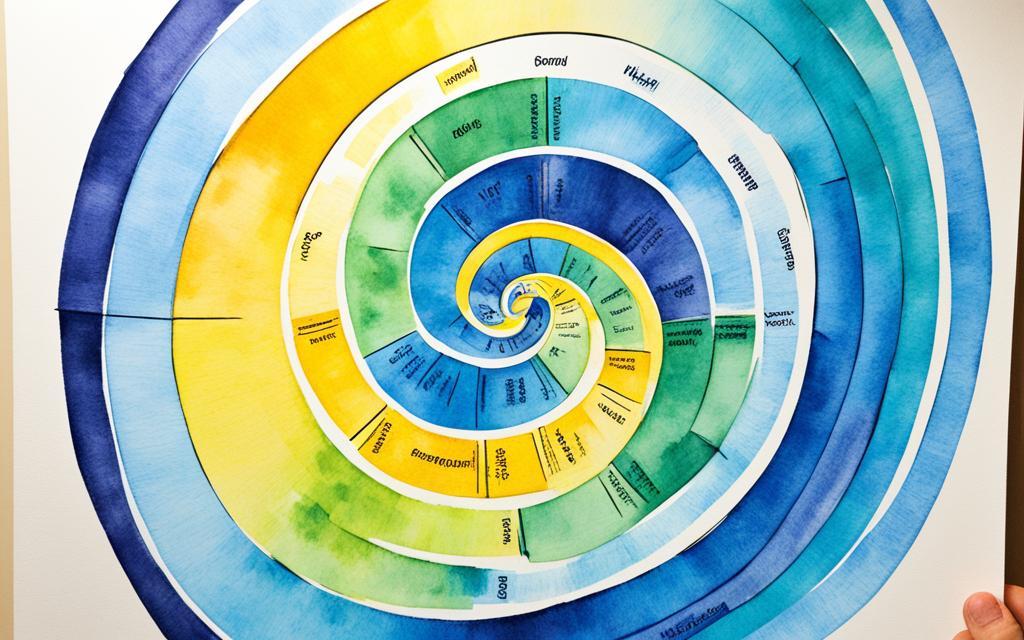D Behavioral Therapy in India: Guide
D Behavioral Therapy: Welcome to our comprehensive guide on dialectical behaviour therapy (DBT) in India. In this article, we will explore how DBT can contribute to mental wellbeing and address conditions like anxiety and depression by using effective strategies. India is a diverse country with unique challenges, and DBT offers a valuable approach to support individuals in their mental health journey.
DBT is a type of therapy that combines elements of cognitive behavioural therapy (CBT) and other psychotherapeutic techniques. It focuses on helping individuals develop skills to manage emotions, regulate behaviour, and improve relationships.
Key Takeaways:
- DBT is an effective therapy for addressing mental wellbeing, anxiety, and depression in India.
- It combines elements of cognitive behavioural therapy and other techniques to help individuals develop crucial skills.
- DBT emphasizes acceptance, change, mindfulness, and effective strategies for promoting mental health.
- It targets anxiety by using specific techniques and strategies to help individuals cope and overcome their symptoms.
- DBT is also beneficial in addressing depression, providing effective strategies for long-term recovery.
What is Dialectical Behaviour Therapy?
Dialectical Behaviour Therapy (DBT) is a form of psychotherapy that focuses on helping individuals develop new strategies for managing their emotions and improving their overall quality of life. It was originally developed by psychologist Marsha M. Linehan in the late 1980s and has since gained recognition as an effective treatment for various mental health conditions.
DBT is often compared to Cognitive Behavioural Therapy (CBT) but differs in certain key aspects. While both therapies emphasize the importance of identifying and changing negative thought patterns and behaviours, DBT places a significant emphasis on acceptance and validation of the individual’s experiences. This sets it apart from CBT, which primarily focuses on challenging and changing negative thoughts.
“DBT combines the principles of cognitive behavioural therapy with the concept of dialectics, emphasizing the importance of finding a balance between acceptance and change. It is an evidence-based treatment that has shown promising results in helping individuals manage conditions such as borderline personality disorder, substance use disorders, self-harm, and suicidal ideation.” – Dr. Priya Sharma, Clinical Psychologist
DBT incorporates various techniques and strategies to enhance emotional regulation, distress tolerance, mindfulness, and interpersonal skills. It is typically delivered in a comprehensive treatment program that includes individual therapy, group skills training, phone coaching, and therapist consultation.
The Four Modules of DBT
- Mindfulness: This module focuses on developing present-moment awareness, acceptance, and non-judgmental observation of thoughts, emotions, and sensations.
- Distress Tolerance: The distress tolerance module equips individuals with skills to tolerate and survive crises and distressing situations without resorting to harmful or impulsive behaviors.
- Emotional Regulation: In this module, individuals learn effective strategies to identify, understand, and regulate their emotions, helping them to respond more adaptively and reduce emotional intensity.
- Interpersonal Effectiveness: The interpersonal effectiveness module aims to improve communication skills, assertiveness, and boundary-setting in relationships, enabling individuals to navigate social interactions more effectively.
DBT has shown promising results in addressing a wide range of mental health conditions, including borderline personality disorder, depression, anxiety disorders, substance use disorders, eating disorders, and post-traumatic stress disorder (PTSD). Research has consistently demonstrated its effectiveness in reducing self-destructive behaviors, improving emotional regulation, and enhancing overall quality of life.
Understanding Mental Health in India
In India, mental health is an increasingly pressing concern, necessitating effective interventions to address the psychological challenges faced by individuals. Dialectical behaviour therapy (DBT) is one such intervention that holds promise in promoting mental well-being.
The role of mental health professionals, particularly psychologists, is crucial in providing support and treatment to individuals grappling with various mental health issues. These professionals employ their expertise to ensure culturally sensitive and evidence-based care.
Awareness and understanding of mental health have grown significantly in recent years, prompting the development of initiatives and programs aimed at improving access to mental health services. The advent of DBT in India has further contributed to expanding the treatment options available to individuals seeking support.
“Mental health is just as important as physical health. Seeking help and support from a psychologist can make a significant difference in managing mental health challenges.” – Dr. Ravi Mehta, Psychologist
Through DBT, psychologists utilize a comprehensive approach that incorporates mindfulness, acceptance, and effective coping strategies to empower individuals to navigate their mental health issues successfully. By addressing emotional dysregulation, distress tolerance, and interpersonal difficulties, DBT equips individuals with the skills necessary to lead fulfilling lives.
It is essential to acknowledge the unique cultural context in India and integrate this cultural sensitivity into mental health interventions. By understanding the socio-cultural factors that influence mental health, psychologists can tailor their treatment plans to effectively support individuals.
The Need for Mental Health Support in India
- The prevalence of mental health disorders: India has a high burden of mental health disorders, with approximately 9% of the population affected by some form of mental illness. The most common conditions include anxiety disorders, depression, and substance use disorders.
- Stigma and lack of awareness: Mental health concerns in India are often stigmatized, leading to significant barriers in seeking help. Lack of awareness and understanding further contribute to delays in seeking proper treatment.
- Inadequate mental health infrastructure: Despite the increasing recognition of the importance of mental health, the availability of mental health services, especially in rural areas, remains limited. There is a significant shortage of mental health professionals, contributing to the treatment gap.
To address these challenges, the integration of evidence-based interventions like DBT is vital. By raising awareness, promoting destigmatization, and fostering accessibility, mental health professionals can play a pivotal role in transforming the mental health landscape in India.
The Role of Psychologists in Mental Health Care
Pychologists are highly trained professionals who specialize in diagnosing and providing therapeutic interventions for a wide range of mental health conditions. They employ a variety of evidence-based techniques, including cognitive-behavioral therapy, DBT, and psychotherapy to help individuals improve their mental well-being.
Psychologists play a crucial role in:
- Assessment and diagnosis: Conducting thorough evaluations and assessments to identify mental health disorders and provide accurate diagnoses.
- Treatment planning and intervention: Creating personalized treatment plans that incorporate evidence-based therapies, such as DBT, to address specific mental health concerns.
- Support and guidance: Offering support, guidance, and a safe space for individuals to express their emotions, explore their experiences, and develop coping strategies.
- Advocacy and education: Advocating for mental health awareness, promoting destigmatization, and providing education to individuals, families, and communities about mental health issues and available resources.
The expertise and guidance of psychologists are invaluable in navigating the complexities of mental health, providing individuals with the tools and support they need for their journey towards recovery.
Image: Mental Health in India
| Challenges in Mental Health Care | Solutions |
|---|---|
| Stigma and lack of awareness | Education and advocacy campaigns to raise awareness and combat stigma surrounding mental health |
| Inadequate mental health infrastructure | Expansion of mental health services, particularly in rural areas, through the establishment of clinics and telehealth platforms |
| Shortage of mental health professionals | Investment in training programs and incentives to attract and retain mental health professionals |
| Limited access to affordable treatment | Implementation of government initiatives to provide subsidized or free mental health care services |
The Core Principles of DBT
In dialectical behaviour therapy (DBT), several core principles serve as the foundation for promoting mental health and wellbeing. These principles encompass acceptance, change, mindfulness, and effective strategies. By incorporating these principles into therapy, individuals can gain valuable insights and develop practical skills to navigate the challenges of their mental health journeys.
Acceptance
One of the fundamental principles of DBT is acceptance. This involves acknowledging and validating one’s emotions, thoughts, and experiences without judgment or resistance. By cultivating acceptance, individuals can develop a compassionate and non-judgmental stance towards themselves, allowing them to better understand their inner struggles and work towards positive change.
Change
The principle of change in DBT emphasizes the importance of actively seeking transformation and growth. It involves identifying areas in one’s life that require improvement and setting specific goals to achieve positive outcomes. Through evidence-based techniques, individuals can acquire effective strategies to modify unhelpful behaviors, regulate emotions, and establish healthier coping mechanisms.
Mindfulness
Mindfulness plays a vital role in DBT as it encourages individuals to cultivate present-moment awareness and develop a non-judgmental attitude towards their experiences. By practicing mindfulness, individuals can enhance their ability to observe and engage with their thoughts, emotions, and sensations. This heightened awareness empowers individuals to respond to life’s challenges in a more conscious and intentional manner, leading to improved mental wellbeing.
Effective Strategies
In DBT, effective strategies are employed to support individuals in their mental health journey. These strategies include psychoeducation, skills training, and problem-solving techniques. Psychoeducation aims to provide individuals with a better understanding of their condition and equip them with knowledge on how to manage symptoms effectively. Skills training focuses on developing practical skills, such as emotion regulation, interpersonal effectiveness, and distress tolerance, which are essential for maintaining mental stability. Problem-solving techniques help individuals identify and address specific challenges they encounter, empowering them to overcome obstacles and reach their desired goals.
The combination of acceptance, change, mindfulness, and effective strategies in DBT offers individuals a comprehensive approach to address their mental health concerns. By embracing these core principles, individuals can foster personal growth, develop healthier coping strategies, and ultimately cultivate a more fulfilling and balanced life.
Targeting Anxiety with DBT
Anxiety disorders can significantly impact your daily life, causing distress and hindering your ability to function optimally. Thankfully, dialectical behaviour therapy (DBT) offers effective strategies to help you cope with and overcome anxiety symptoms.
The key to DBT’s success in anxiety treatment lies in its holistic approach. DBT combines elements of cognitive-behavioural therapy with mindfulness, acceptance, and change-oriented strategies, providing a comprehensive framework for managing anxiety disorders.
One of the specific techniques used in DBT for anxiety is the skill of grounding. Grounding helps you connect to the present moment, diverting your attention from anxious thoughts and sensations. By anchoring yourself in the here-and-now, grounding techniques can effectively reduce feelings of anxiety and promote a sense of calm.
Another valuable strategy in DBT for anxiety is the use of coping skills. Coping skills equip individuals with practical tools to manage intense moments of anxiety. These skills may include deep breathing exercises, progressive muscle relaxation, and engaging in self-soothing activities. By developing a repertoire of coping skills, individuals can effectively regulate their anxiety and prevent it from escalating.
Furthermore, dialectical behaviour therapy emphasizes the cultivation of emotional awareness and tolerance. This aspect of DBT helps individuals recognize and accept their emotions without judgment, reducing the intensity of anxious feelings. By practicing mindfulness and learning to observe their thoughts and emotions non-judgmentally, individuals can develop a greater ability to manage anxiety in a healthy and productive manner.
DBT also places importance on building distress tolerance skills. Anxiety can trigger distressing thoughts and overwhelming feelings, making it challenging to navigate daily life. Distress tolerance skills provide individuals with strategies to tolerate and manage distressing situations more effectively. These skills may involve self-soothing activities, grounding exercises, and creating a crisis survival plan.
Overall, dialectical behaviour therapy offers an integrated approach to anxiety treatment, ensuring that individuals receive comprehensive and effective strategies for managing their anxiety. By working with a trained DBT therapist, individuals can develop the skills necessary to overcome anxious thoughts and sensations, leading to a healthier and more balanced life.
Using effective strategies such as grounding, coping skills, emotional awareness, and distress tolerance, dialectical behaviour therapy provides an empowering pathway towards freedom from anxiety. The specific techniques employed in DBT can be tailored to your unique needs and circumstances, allowing for personalized and targeted treatment.
Addressing Depression through DBT
Depression can have a significant impact on an individual’s overall well-being and quality of life. However, with the application of dialectical behaviour therapy (DBT), individuals can find effective strategies for managing and alleviating symptoms of depression, paving the way for long-term recovery.
DBT, a form of therapy rooted in the principles of cognitive-behavioural therapy, offers a comprehensive approach to treating depression. By incorporating mindfulness, acceptance, and change-oriented techniques, DBT equips individuals with the tools they need to navigate the challenges of depression and achieve mental wellness.
One of the key features of DBT is its emphasis on learning and applying coping skills to regulate emotions and manage distress. Through skill development in areas such as emotion regulation, interpersonal effectiveness, and distress tolerance, individuals gain the ability to better understand and address their depressive symptoms.
“DBT has been instrumental in my journey towards overcoming depression. The skills it provided me with allowed me to regain control over my emotions and make positive changes in my life. I am now able to manage my depressive symptoms and live a more fulfilling life.” – Testimonial from a DBT participant
In addition to equipping individuals with effective coping skills, DBT also addresses the underlying factors that contribute to depression. The therapy helps individuals identify and challenge negative thought patterns, foster self-compassion, and develop a sense of mastery and personal growth.
Comparing DBT to Other Therapeutic Approaches for Depression
| Therapeutic Approach | Key Features | Effectiveness |
|---|---|---|
| CBT | Focuses on identifying and changing negative thought patterns and behaviours | Highly effective in reducing symptoms of depression |
| DBT | Combines CBT techniques with mindfulness and emotion regulation skills | Effective in addressing both depressive symptoms and underlying factors that contribute to depression |
| Psychopharmacology | Prescription of antidepressant medication | Used in conjunction with therapy and can be effective for moderate to severe depression |
Utilizing the skills and strategies taught in DBT, individuals can experience a reduction in depressive symptoms, increased emotional resilience, improved interpersonal relationships, and an enhanced sense of overall well-being.

By addressing depression through DBT, individuals gain a holistic and empowering approach to their mental health. The therapeutic techniques and practices learned in DBT provide individuals with the tools and skills necessary to manage their depression and embark on a path toward a more fulfilling life.
DBT Skills for Emotional Regulation
In dialectical behaviour therapy (DBT), individuals learn specific skills and techniques to effectively regulate their emotions, leading to improved mental wellbeing. These skills empower individuals to manage intense emotions, reduce impulsive reactions, and cultivate a sense of control and balance.
1. Mindfulness
One of the foundational skills in DBT is mindfulness. Practising mindfulness involves bringing one’s attention to the present moment, observing thoughts and emotions without judgment. Mindfulness allows individuals to develop self-awareness, reduce emotional reactivity, and make conscious choices rather than reacting impulsively.
2. Distress Tolerance
Distress tolerance skills teach individuals how to cope with and tolerate distressing situations without engaging in harmful or impulsive behaviour. These skills include using self-soothing techniques, engaging in distracting activities, and accepting reality rather than fighting against it. By developing distress tolerance skills, individuals can effectively navigate stressful situations and manage their emotions in more adaptive ways.
3. Emotional Regulation
Emotional regulation skills help individuals identify and understand their emotions, as well as manage and express them in healthy ways. These skills include identifying emotional triggers, implementing strategies to reduce emotional intensity, and enhancing emotional resilience. By strengthening emotional regulation skills, individuals can experience greater emotional stability and a higher level of overall wellbeing.
4. Interpersonal Effectiveness
Interpersonal effectiveness skills in DBT focus on improving communication, setting boundaries, and building healthy relationships. These skills assist individuals in expressing their needs, desires, and limits effectively while maintaining self-respect and strengthening interpersonal connections. By enhancing interpersonal effectiveness, individuals can foster healthier and more fulfilling relationships, which contribute to their mental health and overall wellbeing.
5. Self-Validation
Self-validation is an important aspect of DBT, as it helps individuals acknowledge and validate their own emotions and experiences. By cultivating self-validation skills, individuals can develop a compassionate and accepting attitude towards themselves, fostering self-esteem and building resilience. Self-validation allows individuals to navigate challenging emotions with self-compassion, ultimately promoting mental wellbeing.
By integrating these DBT skills into daily life, individuals can enhance their emotional regulation abilities, cultivate healthier relationships, and improve their overall mental wellbeing. Practising these skills, under the guidance of a trained DBT therapist, can lead to transformative changes and a greater sense of self-awareness and emotional balance.
Implementing dialectical behaviour therapy (DBT) skills for emotional regulation is essential for individuals seeking to manage their emotions effectively and improve their mental wellbeing. By practising mindfulness, distress tolerance, emotional regulation, interpersonal effectiveness, and self-validation, individuals can cultivate emotional balance, navigate challenging situations, and enhance their overall mental health.
Interpersonal Effectiveness in DBT
Interpersonal effectiveness plays a crucial role in dialectical behaviour therapy (DBT) and contributes significantly to positive mental health outcomes. In DBT, individuals learn essential skills and techniques to improve communication, establish healthy boundaries, and navigate relationships effectively, ultimately enhancing their overall well-being.
DBT therapy skills empower individuals to develop meaningful connections and cultivate healthy interactions with others. By honing their interpersonal effectiveness, individuals can build stronger relationships, reduce conflict, and improve their overall mental health.
Effective Communication
In the context of DBT, effective communication involves expressing oneself clearly, validating others’ experiences, and active listening. By mastering these skills, individuals can express their needs, concerns, and emotions in a respectful and assertive manner, fostering open and honest dialogue in their relationships.
“Effective communication is the cornerstone of healthy relationships. By enhancing your communication skills through DBT, you can build stronger, more fulfilling connections with others.”
Establishing Healthy Boundaries
Establishing and maintaining healthy boundaries is essential for healthy relationship dynamics. DBT equips individuals with the skills to recognize and communicate their boundaries effectively. This allows individuals to protect their well-being, assert their needs, and navigate relationships with clarity and confidence.
Navigating Challenging Interactions
DBT teaches individuals strategies for effectively managing challenging interactions and conflicts, preventing them from escalating and negatively impacting mental health. With the help of DBT therapy skills, individuals can learn to approach difficult conversations with mindfulness, emotional regulation, and problem-solving techniques, leading to more constructive outcomes.
The Role of Interpersonal Effectiveness in Mental Health
Enhancing interpersonal effectiveness through DBT contributes to overall mental health and well-being in numerous ways. By fostering stronger connections with others, individuals can experience increased support, reduced feelings of isolation, and improved self-esteem. Moreover, effective interpersonal skills can help individuals cultivate healthier coping mechanisms, enhance emotional regulation, and reduce the risk of relapse in mental health conditions.
By placing a strong emphasis on interpersonal effectiveness, dialectical behaviour therapy empowers individuals to build and nurture relationships that support and enhance their mental health.
Image:
Mindfulness in DBT
In dialectical behaviour therapy (DBT), mindfulness plays a crucial role in promoting mental wellbeing. Mindfulness involves developing a present-moment focus, cultivating awareness, and practicing acceptance. By incorporating mindfulness into DBT therapy skills, individuals can enhance their overall emotional regulation and cope effectively with life’s challenges.
Mindfulness exercises in DBT help individuals become more attuned to their thoughts, emotions, and bodily sensations without judgment. This practice enables individuals to observe their experiences without becoming overwhelmed or reactive, fostering a sense of inner calm and clarity.
By training individuals to be fully present in each moment, mindfulness enhances their ability to respond consciously, rather than react impulsively, to stressful situations. This cultivates a state of mind that is open and receptive, allowing individuals to make deliberate choices and respond skillfully to challenges they encounter.
One powerful mindfulness technique used in DBT is the “Three-Minute Breathing Space.” This exercise involves directing attention to the breath, observing physical sensations, thoughts, and emotions that arise, and then consciously expanding awareness to include the entire body and the surrounding environment.
“The Three-Minute Breathing Space exercise in DBT helps individuals ground themselves in the present moment, calm their minds, and gain a larger perspective. By effectively managing their thoughts and emotions, individuals can develop resilience and improve their overall mental health.”
Mindfulness in DBT also supports individuals in developing meta-awareness, which is the ability to observe one’s thoughts and emotions without getting caught up in them. This detachment allows individuals to take a step back and respond to challenging situations from a place of calm and clarity.
Through consistent practice of mindfulness in DBT, individuals can strengthen their ability to regulate their emotions, reduce impulsivity, and make choices aligned with their values and long-term goals.
| Benefits of Mindfulness in DBT | Techniques for Practicing Mindfulness |
|---|---|
|
|
Resources for DBT in India
When it comes to accessing the resources for dialectical behaviour therapy (DBT) in India, individuals have several options available. Various organizations, clinics, and professionals specialize in providing DBT services, ensuring that individuals can receive the help they need to support their mental health journey.
Here are some of the key resources for DBT in India:
- Organization 1: This renowned organization in India offers comprehensive DBT programs led by experienced therapists. They provide individual therapy sessions, group therapy sessions, skills training, and ongoing support to assist individuals in developing effective coping strategies for their mental health concerns.
- Organization 2: With a focus on promoting mental wellbeing, Organization 2 offers DBT services tailored to meet the unique needs of individuals in India. Their team of skilled professionals provides psychoeducation, skills training, and therapy sessions to empower individuals on their mental health journey.
- Clinic 1: Clinic 1 specializes in DBT therapy for various mental health conditions. Their multidisciplinary team of psychologists, psychiatrists, and counselors offers comprehensive assessments, individual therapy, group sessions, and skills training, ensuring a holistic approach to mental health care.
- Clinic 2: Clinic 2 is dedicated to providing DBT services for individuals seeking support for their mental health concerns. Their team of licensed therapists offers a range of therapeutic interventions, including individual therapy, skills training, and group sessions, to aid individuals in improving their emotional regulation and overall mental wellbeing.
- Professional 1: Professional 1 is a highly skilled therapist specializing in DBT. With a compassionate and empathetic approach, they provide individualized treatment plans, focusing on helping individuals develop effective coping strategies and skills for managing their mental health challenges.
These resources offer individuals in India the opportunity to access professional DBT services that can support their mental health and provide them with the tools and strategies needed for their journey towards wellbeing.
Benefits of DBT Resources in India
The availability of DBT resources in India plays a crucial role in addressing the mental health needs of individuals. By accessing DBT services, individuals can:
- Receive evidence-based therapy that has been proven effective in treating various mental health conditions.
- Access specialized professionals with expertise in DBT and a deep understanding of the Indian context.
- Participate in individual therapy, group sessions, and skills training to enhance their emotional regulation and coping strategies.
- Join a supportive community and connect with others who may be going through similar challenges.
- Experience personalized treatment plans that cater to their unique needs and goals.
By embracing these resources and seeking help through DBT, individuals in India can take proactive steps towards improving their mental health and achieving overall wellbeing.
| Resources | Services Offered | Specializations |
|---|---|---|
| Organization 1 | Individual therapy, group therapy, skills training, ongoing support | Comprehensive DBT programs |
| Organization 2 | Psychoeducation, skills training, therapy sessions | Mental wellbeing |
| Clinic 1 | Assessments, individual therapy, group sessions, skills training | Multidisciplinary approach |
| Clinic 2 | Individual therapy, skills training, group sessions | DBT therapy |
| Professional 1 | Individualized treatment plans | Specialization in DBT |
Conclusion
In conclusion, dialectical behaviour therapy (DBT) has emerged as a powerful therapeutic approach in addressing mental wellbeing, anxiety, and depression in India. By utilizing effective strategies, DBT offers individuals the opportunity to transform their lives and overcome the challenges they face.
Throughout this article, we have explored the core principles of DBT, its application in targeting anxiety and depression, and the essential skills it provides for emotional regulation, interpersonal effectiveness, and mindfulness. By incorporating these strategies into their daily lives, individuals can enhance their mental health and cultivate a more fulfilling and balanced existence.
As India’s mental health landscape continues to evolve, it is crucial to recognize the efficacy of interventions like DBT. By prioritizing mental wellbeing, seeking professional help, and accessing the available resources, individuals can embark on a journey towards healing and recovery.
Remember, dialectical behaviour therapy offers hope and empowers individuals to take control of their lives. If you or someone you know is struggling with mental health issues, reach out to a qualified professional who can guide you on this journey towards a healthier, happier future.
FAQ – D Behavioral Therapy
What is dialectical behaviour therapy (DBT)?
Dialectical behaviour therapy (DBT) is a type of psychotherapy that combines elements of cognitive-behavioural therapy (CBT) with strategies from Eastern philosophies, such as mindfulness and acceptance. It focuses on helping individuals develop skills to manage emotions, reduce impulsive behaviours, and improve relationships.
How does dialectical behaviour therapy differ from cognitive-behavioural therapy (CBT)?
While both dialectical behaviour therapy (DBT) and cognitive-behavioural therapy (CBT) are evidence-based therapies, DBT has a specific focus on emotional regulation, mindfulness, and interpersonal effectiveness. DBT is often used for individuals with complex emotional issues, self-harm behaviours, and difficulty regulating intense emotions.
Is dialectical behaviour therapy effective for mental health issues?
Yes, dialectical behaviour therapy (DBT) has been shown to be effective in addressing a wide range of mental health issues, including anxiety disorders, depression, borderline personality disorder, substance abuse, eating disorders, and post-traumatic stress disorder (PTSD).
How long does dialectical behaviour therapy (DBT) usually last?
The duration of dialectical behaviour therapy (DBT) varies depending on the individual’s needs and goals. It typically involves a combination of individual therapy sessions, group skills training, and phone coaching. Treatment can range from several months to a year or more.
Who can benefit from dialectical behaviour therapy (DBT)?
Dialectical behaviour therapy (DBT) can benefit individuals struggling with emotional dysregulation, impulsivity, self-destructive behaviours, and strained interpersonal relationships. It is often used to treat conditions such as borderline personality disorder, but it can also be helpful for individuals with anxiety, depression, substance abuse, and eating disorders.
What are some of the key skills taught in dialectical behaviour therapy (DBT)?
Dialectical behaviour therapy (DBT) teaches a range of skills, including emotion regulation, distress tolerance, interpersonal effectiveness, and mindfulness. These skills help individuals better understand and manage their emotions, cope with distressing situations, improve communication, and cultivate a sense of self-awareness and acceptance.
Are there any resources for dialectical behaviour therapy (DBT) in India?
Yes, there are resources available for dialectical behaviour therapy (DBT) in India. Various clinics, mental health organizations, and certified professionals offer DBT services. It is advisable to consult with a mental health professional or search online directories to find qualified DBT practitioners in your area.
Can dialectical behaviour therapy (DBT) be used as a standalone treatment?
Dialectical behaviour therapy (DBT) can be used as a standalone treatment approach, but it is often recommended as part of a comprehensive treatment plan that may include medication, individual therapy, and other supportive interventions. An individual’s treatment plan is tailored to their specific needs and circumstances.
How can dialectical behaviour therapy (DBT) help with anxiety?
Dialectical behaviour therapy (DBT) can help with anxiety by teaching individuals specific skills to manage and reduce anxiety symptoms. These skills include mindfulness exercises, distress tolerance techniques, and effective strategies for emotion regulation. DBT can also help individuals challenge negative thinking patterns and develop healthier coping mechanisms for anxiety-provoking situations.
Is dialectical behaviour therapy (DBT) suitable for everyone?
While dialectical behaviour therapy (DBT) has been proven effective for many individuals, it may not be suitable for everyone. DBT is typically recommended for individuals who struggle with emotional dysregulation, intense mood swings, impulsiveness, and self-destructive behaviours. A thorough assessment by a trained mental health professional can determine if DBT is the appropriate treatment approach.






